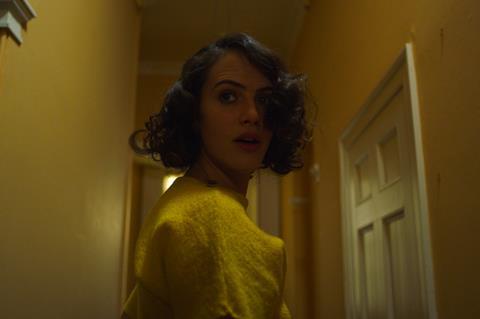Christopher Smith musters up familiar genre elements for this Gothic haunted house horror

Dir: Christopher Smith. UK. 2020. 97mins
Following in the great gothic tradition of the haunted house, The Banishing makes the most of a strong cast and sweeping country estate location even if it offers no surprises other than a handful of well-executed jump scares. That’s something of a shame considering that director Christopher Smith is behind the likes of sharp horror comedy Severance and the brain-bending psychological thriller Triangle; this, his most mainstream film to date — and the first he hasn’t also written himself — is his most tame.
Jessica Brown Findlay is charming as Marianne
However, it’s Smith’s name which will help The Banishing find an audience amongst horror aficionados when it makes its debut on dedicated streamer Shudder, which has taken rights to the film for multiple territories including the UK and the US. With the platform’s profile riding high after the success of lockdown horror Host, demand for solid genre fare will likely work in The Banishing’s favour.
Downton Abbey star Jessica Brown Findlay heads the cast as Marianne, a woman who, in the early years of the Second World War, moves with her devout reverend husband Linus (John Heffernan) and young daughter Adelaide (Anya McKenna-Bruce) to a sprawling country estate with a dark past (the house is based on Borley Rectory, supposedly England’s most haunted property). When Marianne begins to suffer increasingly terrifying visions, it becomes clear that something sinister lurks in her new home and, when it gets its grips into Adelaide, she consults local spiritualist Harry Price (Sean Harris) for help.
The backstory of the house, which is built on the remains of an ancient monastery where disfigured monks meted out unspeakable horrors in the name of a crazed religion, is nothing new in genre cinema. Neither is the idea of unwed mothers deserving scorn and punishment, restless spirits praying on children, or an oppressive force causing normally sane people to lose their minds. Screenwriters David Beton, Ray Bogdanovich and Dean Lines attempt to introduce a new thread in their suggestion that the tensions of the house mirror the rise of facist Germany, but this link is never fully explored.
Where the film is considerably more interesting is in the moments where it plays with the looping of time, mirror images that cannot be trusted, and sequences shown from different and unexpected angles. These are ideas Smith previously executed to great effect in Triangle where, like here, it is suggested that free will is a myth and that we are doomed to repeat our own mistakes. A scene in which multiple versions of Marianne are frozen to the spot as her daughter is consumed by the house is particularly striking.
Jessica Brown Findlay is charming as Marianne, a sharp young women frustrated by the social constraints of the day. Heffernan leaves less of a mark in a somewhat insipid role that requires him to either read from scripture or speak in tongues, but Harris — complete with a shock of red hair — is far more memorable as the softly spoken yet emotionally volatile Harry.
Perhaps the most successful element of the film, however, is Sarah Cunningham’s cinematography, which prowls the shadowy corridors, passes through mirrors and employs claustrophobic close-ups and uneasy, off-kilter framing to make the house feel alive with malevolent intent. Similarly, an excellent score from ToyDrum (who also composed the music for Alice Lowe horror Prevenge) provides the film with its intense, discordant heartbeat.
Production company: Bigscope Films
International sales: WestEnd Films, info@westendfilms.com
Producers: Maya Amsellem, Laurie Cook, Sharon Harel, Jason Newmark
Screenplay: Dave Beton, Dean Lines & Ray Bogdanovich
Cinematographer: Sarah Cunningham
Editor: Richard Smither
Production design: Chris Richmond
Music: ToyDrum
Main cast: Jessica Brown Findlay, John Heffernan, Anya McKenna-Bruce, Sean Harris















![[L-R]: Amanda Villavieja, Laia Casanovas, Yasmina Praderas](https://d1nslcd7m2225b.cloudfront.net/Pictures/274x183/6/4/1/1471641_pxl_20251224_103354743_618426_crop.jpg)








